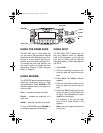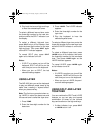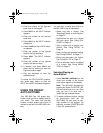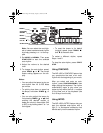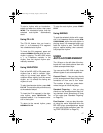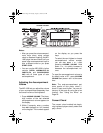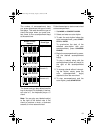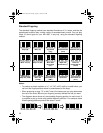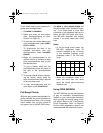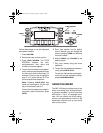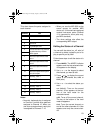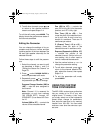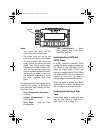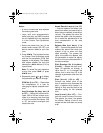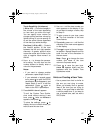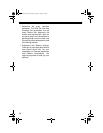
21
Follow these steps to start standard fin-
gering auto accompaniment.
1. Set
MODE
to
FINGERED
.
2. Select and enter an auto-rhythm.
(See “Selecting/Playing an Auto-
Rhythm” on Page 15.)
3. To start the auto-rhythm before your
auto accompaniment, press
START/
STOP
or
INTRO
.
To synchronize the start of the
selected auto-rhythm with your
accompaniment, press
SYNCHRO/
ENDING
.
4. Begin the accompaniment at the
desired interval by pressing at least
three accompaniment keys to play
the desired chord.
To play a melody along with the
accompaniment, press any key(s) to
the right of the accompaniment
keys.
5. To change chords without interrupt-
ing the rhythm, simply press the
auto accompaniment keys required
to form the new chord.
6. To stop accompaniment and the
auto-rhythm, press
START/STOP
.
Full-Range Chords
While the easy random and standard fin-
gering methods limit chord formations to
the accompaniment keys, the full-range
chord method lets you play chords of
any type on any of the MD-1600’s keys.
Set
MODE
to
FULL RANGE CHORD
and
follow the steps under “Standard Finger-
ing.” If you press three or more keys
anywhere on the keyboard that form a
chord, the MD-1600 plays that chord.
The MD-1600 responds with melody
sounds if you press fewer than three
keys.
Notes:
• In the full-range chord mode, the
MD-1600 recognizes these 23
chords in addition to the 15 chords
in the standard fingering mode
(examples show C as the base
note):
• When the composite notes of a
chord are more than five notes
apart, the lowest sound becomes
the base note.
Using FREE SESSION
The MD-1600 lets you set the keyboard
to play an automatic accompaniment
(based on your auto-rhythm selection)
while you play the melody using a tone
you select. Refer to the “Free Session
Chord Progression Chart” on Page 54
for the chord progression, tempo, and
tone associated with each auto-rhythm.
C6 Cm6 C6/9 C/C D/C E/C
F/C G/C A/C B/C BCm/
C
Dm/C
Fm/C Gm/C Am/C Bm/C Dm7-
5/
C
A7/C F7/C Fm7/
C
Gm7/
C
Aadd9/C
42-4043.fm Page 21 Tuesday, August 3, 1999 6:51 AM



